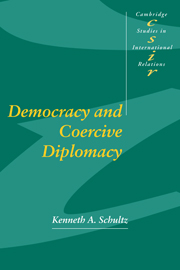Book contents
- Frontmatter
- Contents
- List of figures
- List of tables
- Preface
- 1 Introduction
- Part I Theory
- 2 Information and signaling in international crises
- 3 Democratic politics in international crises
- 4 Domestic competition and signaling in international crises
- Part II Empirical analysis
- Appendices
- References
- Index
- CAMBRIDGE STUDIES IN INTERNATIONAL RELATIONS
3 - Democratic politics in international crises
Published online by Cambridge University Press: 08 October 2009
- Frontmatter
- Contents
- List of figures
- List of tables
- Preface
- 1 Introduction
- Part I Theory
- 2 Information and signaling in international crises
- 3 Democratic politics in international crises
- 4 Domestic competition and signaling in international crises
- Part II Empirical analysis
- Appendices
- References
- Index
- CAMBRIDGE STUDIES IN INTERNATIONAL RELATIONS
Summary
While the arguments in the previous chapter captured the core strategic dilemmas that arise in crisis bargaining, they were built on a stylized view of what states are and how they choose policies. In this view, common to models of international relations, states are unitary actors with a monopoly on some pertinent information about the political and military factors that determine their costs of war. While other states can learn about some of these factors, the primary mode of communication is through external actions: threats and displays of force directed by one state against another. States, in short, are “black boxes”: their external behavior is observable, but their internal workings are largely hidden from view.
For some kinds of states, the black box model is entirely appropriate. Because of the closed nature of their political systems, countries like communist North Korea and Iraq under Saddam Hussein provide outsiders with few glimpses of the processes by which decisions are made. Even in less extreme cases, political structures that bestow influence and authority on a small number of actors can be quite opaque to foreign observers. On the other hand, the black box model is less appropriate when dealing with states whose political institutions generate greater openness and publicity. Democratic states, in particular, have a number of institutions and practices which ensure that decisions are made and debated in a public manner, that information can flow freely between government and governed, and that the government does not monopolize the nation's political discourse. As a result, the state is not a black box, but a transparent or open box into which outside actors can look for clues about the government's motivations and constraints.
- Type
- Chapter
- Information
- Democracy and Coercive Diplomacy , pp. 57 - 83Publisher: Cambridge University PressPrint publication year: 2001



